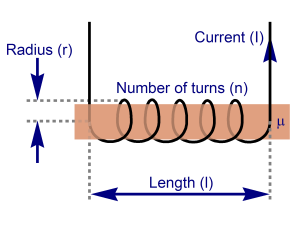Inductance: Difference between revisions
(→Simple) |
|||
| Line 28: | Line 28: | ||
===Middling=== | ===Middling=== | ||
What is the self inductance of a common solenoid? | |||
-The self inductance is the constant in the inductance formula solved above. This means that the self inductance constant for a solenoid is (μ0N/d(piR^2) | |||
===Difficult=== | ===Difficult=== | ||
Revision as of 23:04, 4 December 2015
Made by Mackenzie Rideout
Short Description of Topic
The Main Idea
Inductance is when a current from one coil causes current in a second, coil that is not connected to the original current or coil. A similar affect also happens within singular coils. A coil with current running through it will cause a current in the opposing direction to form. This opposing current actually works to slow down the original current. Because of these opposing currents the original current becomes almost sluggish. This quality is what makes it difficult to increase or decrease any current. Inductance is commonly found in circuits that contain a solenoid.
A Mathematical Model
To be able to successfully compute the inductance of a coil you will have to analyze the magnetic field that surrounds it. In the case of a solenoid, the magnetic field is B=μ0NI/d. For a solenoid this can give you information about the current running through one loop on the solenoid which you can then use to find the current that is running through the entire solenoid from beginning to end. You do this by taking the derivative of the magnetic field with respect to time and then multiplying this result by the number of loops in the solenoid.
A Computational Model
Here is a visual display of inductance in a solenoid 
Examples
Be sure to show all steps in your solution and include diagrams whenever possible
Simple
Emf of an entire solenoid:
B=μ0NI/d emf = |d(mag flux)/dt| = d/dt|μ0NI/d(piR^2)| = μ0NI/d(piR^2)dI/dt emf = N(μ0N/d(piR^2)dI/dt)= (μ0N^2/d(piR^2)dI/dt)
Middling
What is the self inductance of a common solenoid?
-The self inductance is the constant in the inductance formula solved above. This means that the self inductance constant for a solenoid is (μ0N/d(piR^2)
Difficult
Connectedness
- How is this topic connected to something that you are interested in?
- How is it connected to your major?
- Is there an interesting industrial application?
History
Put this idea in historical context. Give the reader the Who, What, When, Where, and Why.
See also
Are there related topics or categories in this wiki resource for the curious reader to explore? How does this topic fit into that context?
Further reading
Books, Articles or other print media on this topic
External links
Internet resources on this topic
References
This section contains the the references you used while writing this page